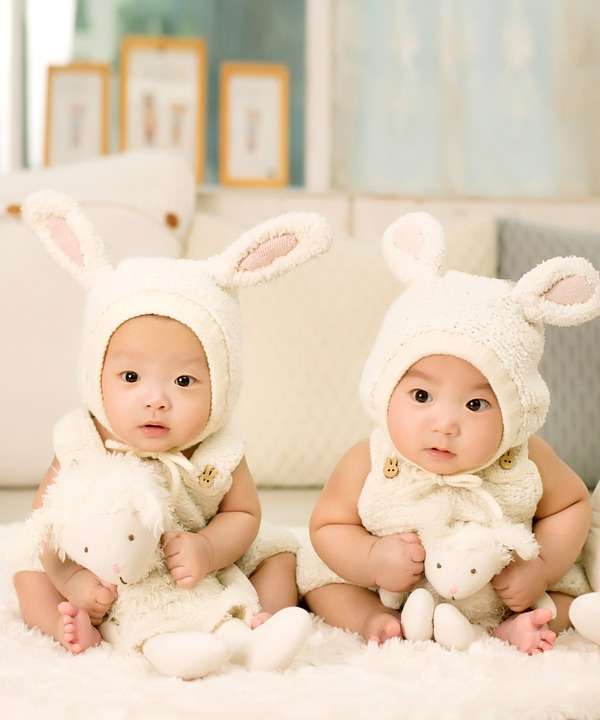By Donna Scrima-Black
As an adult, I consider myself very lucky to have an identical twin sister. Now that we both have our own children, we often talk about the wonderful childhood memories we share—along with a few of the twin-related struggles we wish could be erased. It would be amazing if we could simply press the rewind button on a magical remote control and re-record some past events.
Yet, the reality is that we all have some life lessons to uncover, and that includes twins. In fact, it has taken my twin and me years to learn and then to convey one message: Even though we are a fabulous duo, we are also amazing individuals who must only fulfill the expectations we have for ourselves. I have also become my sister’s number-one fan, encouraging her acting and singing pursuits while she supports my many writing endeavors.
I know—being the twin that I am—I should think twice before giving any advice. Yet if parents of twins benefit by having as much information and guidance as they can muster, who better to share with them unique insights than me, a twin?
Each twin—like every child—needs to feel that she is a special individual. Many times my sister and I were referred to as “the twins,” by well-meaning people in our lives, instead of by our separate names. After a while, we began to feel like one entity, as if we were a pair of shoes, barely distinguishable (except one of us was the left, and the other, the right.) We gently reminded everyone what our names were and responded once we were called by them. Even if twins look similar and have shared interests, it’s vital to nurture each twin’s persona—her strengths, aspirations and talents.
The key to mastering this philosophy is to keep the doors—double doors—of communication open. Parents should schedule alone-time or “special” time for doing an activity of each twin’s choice—even if it’s just to have a conversation. Then when situations arise that twins have trouble handling, they’re more likely to feel comfortable discussing them with adults, parents especially.
Validate each twin’s feelings, even if you don’t understand them. After all, it’s difficult for singletons to understand what it’s like to live as a twin. Having family discussions with all children is a key ingredient in many successful families. Twins, in particular, may need to discuss unique issues such as whether or not they want to dress alike. This is a topic so many parents of twins wonder about; in fact, the ones whom I’ve met have always asked me about it. The answer, to me, is to ask the twins about their feelings once they are old enough. Some toddlers know at an early age what their preferences are. They may even want to dress alike at times and differently at others. This can change as they grow.
For example, my twin and I loved dressing alike as toddlers all the way through sixth grade. Then, when our family moved from the Bronx to the suburbs, we changed our minds. Starting at a new school was difficult enough without peers saying we looked like “The Bobsey Twins.” Students and teachers had been comparing us so much we were compelled to express our individuality. One way of doing this was through our attire.
For the first time, we purchased single clothing items and the doubles that we already had in our closets were worn on different days by each of us. We told our parents about this and asked them to encourage our relatives, who bought us gifts, to honor this request as well.
Adults can help prepare twins and family members for situations they encounter—and model possible responses. I know for my sister and me this would have been extremely helpful in dealing with the insensitive comparisons made—and the ridiculous questions onlookers often ask.
Additionally, our younger sister, who felt “left out” because nobody ever made a “big deal” about her, would also have benefited from these discussions. My twin and I often explained to our younger sister that we didn’t like the constant attention we received—however positive people might have intended it to be—because it often led to onlookers asking or commenting which of us was “nicer,” “prettier,” or “smarter.”
Sly sarcasm, devilish grins
Until we learned how to respond, we usually remained silent, often feeling badly for the twin relegated to second place. As we grew, we learned appropriate responses to these unfair critiques. We used light sarcasm and laughter as powerful tools. When asked which of us was prettier, I might say, “Oh, my sister, of course. She’s gorgeous and I look just like her.”
Or, to the question: “Which one of you is nicer?” I have responded, “Neither of us; we’re both double trouble.” A big grin usually sealed the response nicely.
Each set of twins is a one-of-a-kind partnership. No two sets of kids are really alike. People often generalize about twins because they know one set and think everybody else is the same, but it’s just not true.
Decisions about children, including twins, are specific to every family’s situation. When parents of twins ask me questions about whether or not their twins should be placed in the same class, or be allowed to wear a ring or pierced earrings to differentiate one from the other, the best answer I can give them is that “It’s a personal choice,” based on the circumstances unique to their twins’ relationship.
I always like to assure parents that if they make mistakes—like all parents do—they can make adjustments later and move forward. For example, twins in one of my children’s classes were separated during first grade at the school’s recommendation. For second grade, however, the twins’ parents, based on feedback from their kids, requested that the school place them in the same second grade class.
Although my twin sister lives in a different state, I share an indescribable bond with her. When our children—her three girls and my two boys—are together, it’s as if we are one family. It was like this from the moment our children met. As adults, we remain similar in the ways we dress and our food preferences. We often buy each other identical items, and our families spend holidays and summer vacations together.
Now when we get together, we relish onlookers’ attention and hope one day to do commercials or pursue other twin-related endeavors. We may use the same pitch we used when pursuing our babysitting careers at age 12: “Two for the price of one.”





